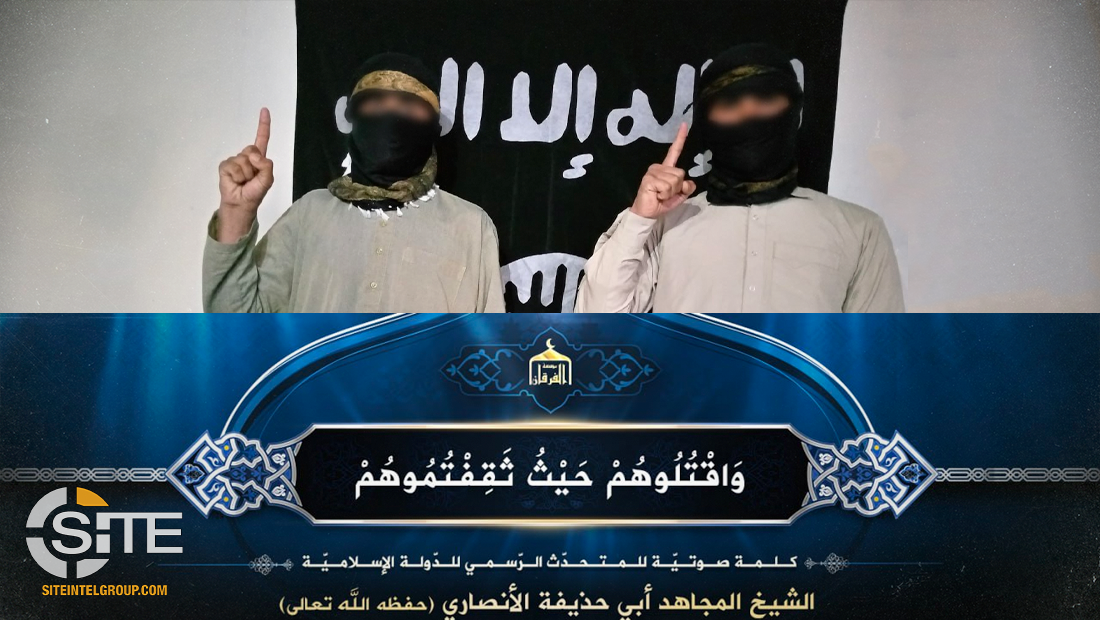SITE Director Rita Katz Analyzes ISIS Spokesman’s New Speech, Iran Attack Claim
By Rita Katz | Published 01.04.2024

I am sharing some brief thoughts on two major Islamic State (IS/ISIS) releases today: a new speech by spokesman Abu Hudhayfa al-Ansari and claim of responsibility for yesterday’s terrorist bombings in the Iranian city of Kerman. My following points touch on the substance and timing of these two items, as well as what they say about ISIS’ current standing in world.
The claim was expected: ISIS’ claim of responsibility does not come as a surprise. The group has already set a precedent for similar attacks in the country via Tehran in 2017, Ahvaz in 2018, and Shiraz in 2022. Ceremonies like that in Kerman yesterday, which took place at the burial site of Qasem Soleimani, are also very fitting to the types of events ISIS targets. Claiming the attack, ISIS described Soleimani as “involved in dozens of massacres against Muslims in Iraq and Syria” and hailed the group’s bombings as “a strong security blow to the Iranian government.”
The attackers: ISIS additionally released pictures of the two attackers in Kerman, identified as “Umar al-Muwahhid and Sayfyllah al-Mujahid,” but did not give any details of their backgrounds. However, it is likely both attackers came from neighboring Afghanistan, where ISIS’ Khorasan Province operates.
Contrast to al-Qaeda: The attack in Kerman reinforces ISIS’ sectarian focus against its Shi’ite enemies. It furthermore juxtaposes the group to al-Qaeda, whose de facto leader, Saif al-Adel, has for years resided in Iran. (Stay tuned for my forthcoming article on this al-Qaeda-Iran dynamic.)
Timing of a campaign: ISIS framed the attack as part of a newly announced campaign called “And Kill Them Wherever You Find Them,” which is the title of Abu Hudhayfa’s new speech. Additional communiques released today by ISIS’ West Africa, Sahel, Sham - Khayr, Central Africa, and East Asia provinces have likewise branded attacks as part of this campaign.
First direct mention of Israel-Hamas War: Since October 7, ISIS has only mentioned the Israel-Hamas war indirectly via its an-Naba newspaper. These an-Naba issues have gestured toward the war implicitly by singling out “Jewish neighborhoods in America and Europe” and reminding supporters to attack on behalf of Muslims “in distress in every situation.” With this new speech, Abu Hudhayfa gives ISIS’ first direct mention of the war, but does not mention Hamas (at least by name), as I explain in the following point.
Opportunity to capitalize: The last thing ISIS wants to do is boost the global profile of Hamas, which it has long deemed an apostate organization and enemy. However, Abu Hudhayfa’s new speech makes direct mention of the situation, framing the Gaza situation within a larger Muslim struggle while lamenting those rallying around the “apostate” and Shi'ite banners of groups like Hamas and Hezbollah. The speech marks ISIS’ latest attempt to exploit growing anger and unrest around the world by inserting itself into the conversation.
A lone wolf resurgence: Abu Hudhayfa’s speech comes as ISIS-inspired lone wolf activity in the West rises amid the Israel-Hamas War, as seen with a foiled plot in Las Vegas, a knife and hammer attack in Paris, and a shooting in Brussels. Before the ongoing Israel-Hamas War, ISIS’ last officially claimed lone wolf attack in the West was the 2020 Vienna shooting. As I wrote in a recent article on this unraveling resurgence, “With the Israel-Hamas war fueling unrest and anger across the world—all while ISIS continues to exploit any Internet venue it can find—it seems the West may suffer these threats once more should circumstances not change.”
A waned state of ISIS: Though ISIS evidently still commands influence among willing lone wolf attackers—and maintains a capability to carry out deadly, coordinated attacks like that in Iran—it is really no different than any other guerilla terrorist organization. It has no identifiable leader, no central headquarters to its “caliphate,” and no near-term prospects to regain the footing it once held in the Middle East.
These and other insights by Ms. Katz can be read on her LinkedIn and Threads accounts.

Rita Katz
Executive Director & Founder
Rita Katz is the Executive Director and founder of the SITE Intelligence Group, the world’s leading non-governmental counterterrorism organization specializing in tracking and analyzing online activity of the global extremist community. She has authored two acclaimed books on terrorism: Saints and Soldiers (Columbia University Press, 2022) and Terrorist Hunter (Harper Collins, 2003






